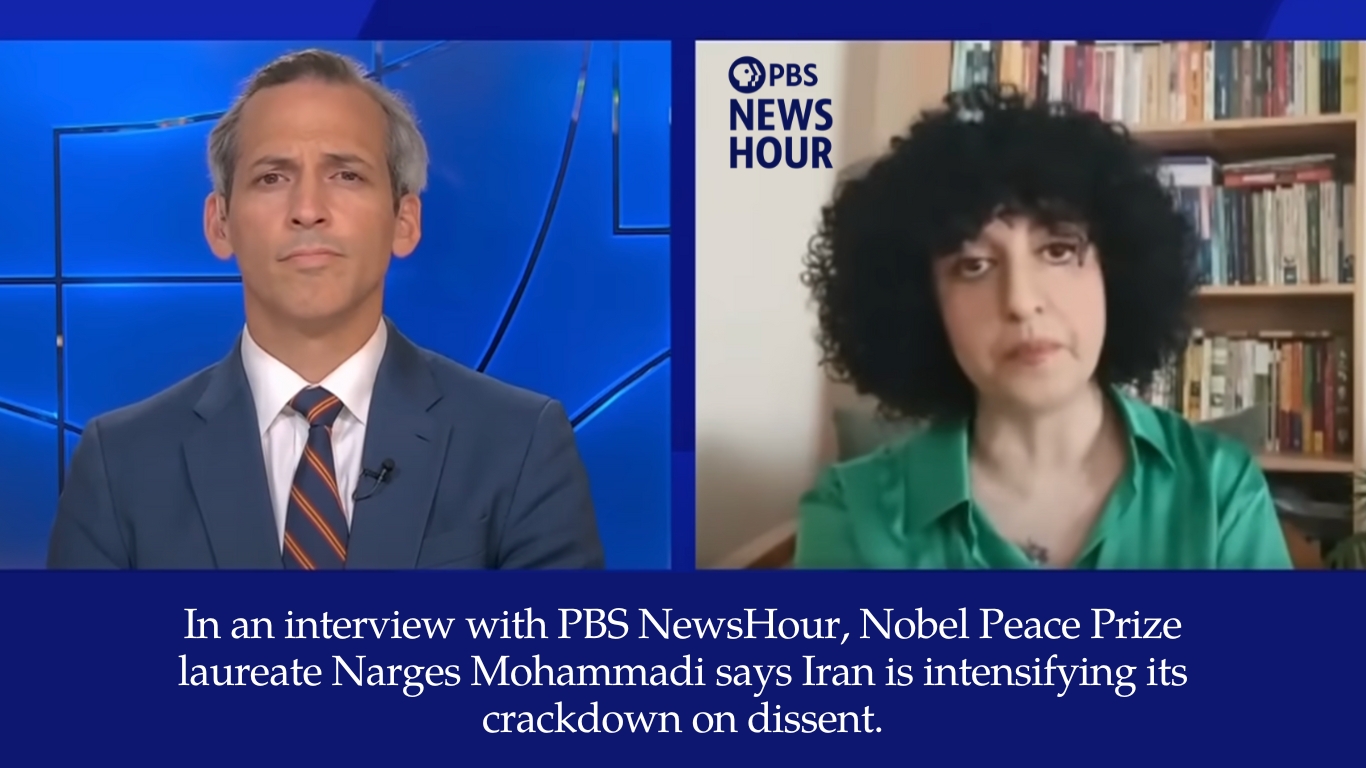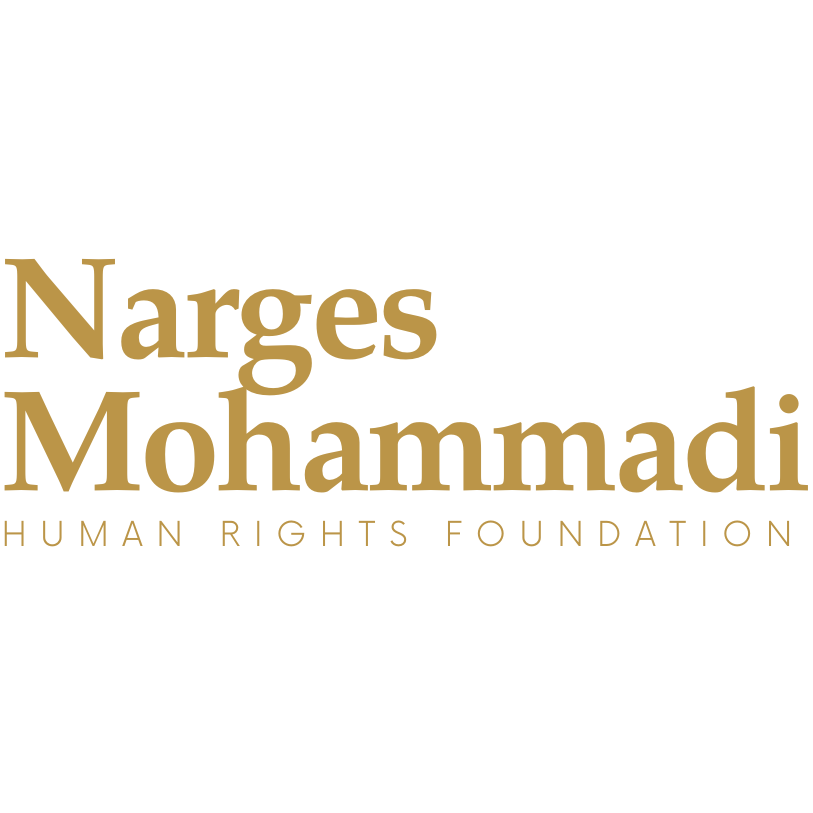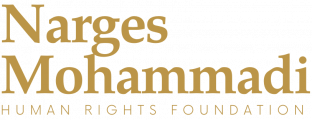
Iran intensifying crackdown on dissent, Nobel laureate says
In an interview with PBS NewsHour, Nobel Peace Prize laureate Narges Mohammadi says Iran is intensifying its crackdown on dissent.
July 2, 2025 | 6m 5s | Closed Captions available
Watch the full video of their conversation: “Iran is intensifying its crackdown on dissent, Nobel laureate says.”
Iranian officials say they aren’t closing the door to diplomacy, but say there are no plans for talks with the U.S. AMNA NAWAZ: In the meantime, the Iranian government has launched a massive crackdown since the war with Israel and the U.S. ended.
The crackdown is ostensibly meant to find Israeli spies, but Nick Schifrin spoke earlier today with an Iranian Nobel peace laureate, who describes a harsh stifling of all dissent.
NICK SCHIFRIN: In Tehran today, the regime is stalking its enemies, hundreds of arrests, alleged Israeli collaborators paraded on state TV, and checkpoints around the country.
NARGES MOHAMMADI, Nobel Peace Prize Laureate (through translator): In times like these, the Islamic Republic uses every tool at its disposal to intensify its repression of the Iranian people.
NICK SCHIFRIN: For 30 years, Narges Mohammadi has fought for democracy and human rights, and in 2023 won the Nobel Peace Prize in absentia.
She’s banned from travel and has been repeatedly arrested.
Most recently, she was held in Iran’s notorious Evin prison and was released in December on house arrest, where she spoke with us today.
NARGES MOHAMMADI (through translator): The Islamic Republic is now using the war with Israel as a pretext to intensify its crackdown.
NICK SCHIFRIN: Israel’s 12-day campaign against Iran facilitated by a massive intelligence penetration across society, and now Iran says it’s hunting for Israeli spies and their weapons of choice.
NARGES MOHAMMADI (through translator): I witnessed Islamic Revolutionary Guard Corps forces in Tehran stopping cars and dumping all the passengers’ belongings into the street, supposedly while searching for drones.
It’s an insult to the intelligence and dignity of the Iranian people.
NICK SCHIFRIN: And Mohammadi says the regime is extending its repression of the Women, Life, Freedom movement launched following the 2022 death of Mahsa Amini in police custody after she was arrested for not wearing a headscarf.
NARGES MOHAMMADI (through translator): Over the past few days, I have received reports that even women sitting quietly in cafes wearing headscarves, but not full veils, were confronted by armed guards who stood over them and ordered them to cover more fully.
This shows that the Islamic Republic is now using this opportunity to intensify its campaign against women.
Civil society activists, especially women’s rights defenders and media figures, are under intense pressure.
Many have been summoned for questioning, visited by security forces.
Their families and lawyers have no information about their whereabouts.
The regime claims it is cracking down on spies, but, in reality, it’s suppressing the democratic movement.
NICK SCHIFRIN: Human rights groups say, since Israel attacked on June 13, Iran has executed at least six people for spying for Israel.
And Iran’s Parliament fast-tracked a bill that would allow punishing espionage or cooperation with hostile governments with the death penalty.
NARGES MOHAMMADI (through translator): If enacted, it will dramatically expand the scope and frequency of executions in Iran.
We’re likely to see more prisoners placed on death row.
The consequences of this law will be extremely severe.
NICK SCHIFRIN: On June 23, Israel targeted Evin prison.
Iranian authorities said more than 70 were killed inside.
Many political prisoners were evacuated.
NARGES MOHAMMADI (through translator): After the bombing, it was the Islamic Republic’s security and military forces that imposed harsh measures on the prisoners.
They were handcuffed, blindfolded and placed under heavy guard with snipers watching over them.
Overnight, they were taken out and transferred under extreme security conditions to some of the worst prisons in the country.
NICK SCHIFRIN: And what are the conditions that those prisoners face today since they have been moved?
NARGES MOHAMMADI (through translator): The women were taken to Qarchak Prison, where I spent several months.
I know firsthand how intolerable the conditions are there.
There are no proper health care facilities.
Their situation is deeply alarming.
There isn’t even safe drinking water available.
I have received very disturbing reports about the men who were transferred to the Greater Tehran prison.
There’s no access to clean drinking water.
We fear that prisoners could die from lack of water, food and medical care.
NICK SCHIFRIN: Over the 12-day war with Israel, Iranian authorities now say nearly 1,000 people died.
Many more were wounded.
In general, how are Iranians coping today?
NARGES MOHAMMADI (through translator): After the 12-day war, the Islamic Republic did nothing to improve the lives of the people, despite the immense suffering they endured.
The regime shows no real concern for the public’s hardship.
Instead, it continues to expose people to even greater repression.
During the 12-day war, I was in Tehran.
The city was under attack day and night, and we had no refuge.
The Internet was cut off and we lost contact with many of our friends and even with our families.
We were caught between two fronts, the Islamic Republic’s longstanding war against the Iranian people and a military conflict with Israel.
Yet, despite all this, the Iranian people continue to demand peace, prosperity, development, freedom and democracy, carried out through the will and agency of the Iranian people.
NICK SCHIFRIN: An Iranian will that in the past has demanded democracy, but is now handcuffed.
For the “PBS News Hour,” I’m Nick Schifrin.
از تشدید اعدام، وخامت وضعیت زندانیان سیاسی عقیدتی و افزایش فشار و سرکوب جنبش دموکراتیک مردم ایران بعد از جنگ نگرانم.
در واقع مردم ایران میان دو جبهه گرفتارند: جنگ همیشگی جمهوری اسلامی با مردم و جنگ نظامی اسراییل با جمهوری اسلامی.
سرکوب گسترده با بهانه مقابله با جاسوسان؛ تهدیدی تازه برای فعالان و زنان
به گزارش PBS، نیروهای سپاه پاسداران در تهران و شهرهای مختلف با ایجاد ایستهای بازرسی و بازرسی خودروها و اموال شخصی مردم، فضای رعب و وحشت را تشدید کردهاند.
نرگس محمدی در اینباره میگوید: «در چنین شرایطی، جمهوری اسلامی از هر ابزاری برای تشدید سرکوب مردم استفاده میکند. من خود شاهد بودم که نیروهای سپاه در تهران خودروها را متوقف میکردند. وسایل مسافرانی را در خیابان میریختند، بهبهانه جستجوی پهپاد. این توهین به شعور و کرامت مردم ایران است.»
محمدی که طی سه دهه گذشته همواره برای دموکراسی و حقوق بشر در ایران مبارزه کرده و چندین بار بازداشت شده، آخرین بار پس از ماهها حبس در زندان اوین، در آذرماه با توقف حکم به خانه منتقل شد و در همین شرایط با خبرنگار PBS گفتوگو کرد.
او تأکید کرد جمهوری اسلامی اکنون از جنگ با اسرائیل بهعنوان بهانهای برای سرکوب بیشتر زنان و جنبش «زن، زندگی، آزادی» استفاده میکند.
«در روزهای اخیر گزارشهایی دریافت کردهام مبنی بر اینکه حتی زنانی که در محل های عمومی مثل کافه و… ا آرام نشستهاند، اما حجاب کامل ندارند، توسط نیروهای مسلح تهدید میشوند تا بیشتر خود را بپوشانند. این یعنی رژیم فرصت را غنیمت شمرده تا سرکوب زنان را هم تشدید کند.»
به گفته محمدی، بسیاری از فعالان مدنی، مدافعان حقوق زنان و روزنامهنگاران در روزهای اخیر بازجویی شده یا از سوی نهادهای امنیتی تهدید، احضار و برخی بازداشت شدهاند.
او میگوید:«خانوادهها و وکلای این افراد هیچ اطلاعی از محل نگهداری آنان ندارند. حکومت ادعا میکند با جاسوسان مقابله میکند، اما در واقع جنبش دموکراتیک مردم را سرکوب میکند.»
* افزایش اعدامها و خطر قانون جدید
سازمانهای حقوق بشری اعلام کردهاند که از زمان حمله اسرائیل در ۲۴ خرداد، دستکم شش نفر در ایران به اتهام جاسوسی برای اسرائیل اعدام شدهاند. مجلس ایران نیز لایحهای را با سرعت تصویب کرده که مجازات جاسوسی و همکاری با دولتهای «متخاصم» را تا اعدام افزایش میدهد.
محمدی هشدار داده است: «در صورت اجرایی شدن این قانون، دامنه و تعداد اعدامها در ایران بهشدت افزایش خواهد یافت و زندانیان بیشتری در معرض حکم اعدام قرار میگیرند. تبعات این قانون بسیار سنگین خواهد بود.»
* وضعیت وخیم زندانیان سیاسی پس از بمباران اوین
نرگس محمدی همچنین درباره وضعیت زندانیان سیاسی پس از بمباران زندان اوین توسط اسرائیل در دوم تیر گفت: “پس از بمباران، نیروهای امنیتی و نظامی جمهوری اسلامی، اقدامات سرکوبگرانه شدیدی را علیه زندانیان اعمال کردند. آنها را دستبند زدند، پابند بستند و با نظارت تکتیراندازان تحت کنترل شدید به زندانهای بدنام منتقل کردند.»
وی افزود زنان زندانی به زندان قرچک منتقل شدهاند که خود او نیز ماهها در آنجا محبوس بوده است: «در قرچک امکانات درمانی مناسب وجود ندارد و حتی آب آشامیدنی سالم هم نیست. گزارشهایی که از وضعیت مردان منتقلشده به زندان بزرگ تهران دریافت کردهام هم بسیار نگرانکننده است؛ آنها به آب آشامیدنی پاک دسترسی ندارند و از نبود غذا و مراقبتهای پزشکی رنج میبرند.»
* مردم ایران؛ زیر فشار دو جبهه
در پایان این گفتگو، نرگس محمدی خاطرنشان کرد: «پس از جنگ ۱۲ روزه، جمهوری اسلامی هیچ تلاشی برای بهبود وضعیت مردم نکرد. اینترنت قطع بود و ارتباطات ما با خانوادههایمان قطع شد. مردم ایران در میان دو جبهه گرفتار شدهاند: جنگ همیشگی جمهوری اسلامی علیه مردم خود و جنگ نظامی اسرائیل با جمهوری اسلامی. با این حال مردم همچنان خواهان رفاه، توسعه، آزادی و دموکراسی و صلح اند با قدرت ، اراده و کنشگری خودشان.»


